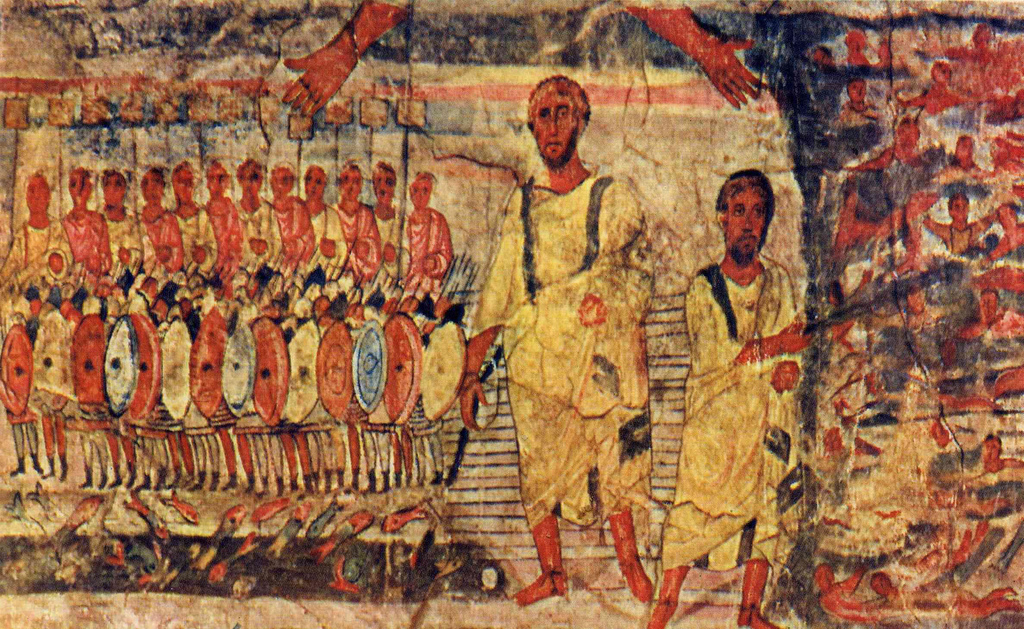Commentary on Parashat Beshalach, Exodus 13:17-17:16
There’s a joke that’s been making the Internet rounds for a while that captures the essence of Jewish holidays: “They tried to kill us, we won, let’s eat.” No holiday is better described this way than Passover, which might be summarized as “Pharaoh enslaved us, we got free, let’s eat.”
Parashat Beshalach describes “getting free” in all its frightening, liberating, gory, whining detail. Pharaoh sends the people of Israel, his slaves, out of Egypt as they have requested, only to change his mind and chase after them to return them to slavery.
A Struggle From the Beginning
The people, frightened, flee to the shores of the Red Sea, where God miraculously parts the waters, and they walk free to the other side, only to see their pursuers drowned in the sea. The people sing and dance in their joy at this hard-won freedom and begin the long, hard walk home, complaining from step one about the lack of food and water. They are attacked by Amalek, who will become the quintessential enemy, but thanks to Moses, Aaron, and Hur, they prevail, and journey on.
The joy of liberation is palpable here; we can almost hear their voices singing, see them dancing a wild ecstatic dance. The people of Israel is born here, brought through the birth canal of the parted sea, born in joy and singing. But war is born here, too, inextricably intertwined with our people’s birth; the pursuing Egyptians and the attacking Amalekites are as much a part of this birth as are Moses’ song and Miriam‘s dance.

Help us keep Jewish knowledge accessible to millions of people around the world.
Your donation to My Jewish Learning fuels endless journeys of Jewish discovery. With your help, My Jewish Learning can continue to provide nonstop opportunities for learning, connection and growth.
From the beginning of our life as a people, in part rooted in this reading, we have understood that “they tried — are trying, will try — to kill us” and that it is our job, among many, to try to win. Later history will show that often we don’t win, and we become not dancing victors, but frequent victims, taking on that identity as strongly as — if not more strongly than — that of victor.
God’s Role in Battle
But we live in complex times, and these well-worn identities no longer suffice. Jews in America and Israel are no longer simply victims, notwithstanding the violence in Israel and the evidence of anti-Semitism in America and elsewhere. And the victor’s role comes at a high price. We need new images and new visions to guide us. A new look at where it all started will enable us to expand see new possibilities and have new hope.
A core question emerging from this week’s Torah reading is that of God’s role: Does God want the people to be warriors, and to be the Warrior among them, to always lead them to victory in battle, as the Song of Deborah in this week’s Haftarah (prophetic reading) would have it?
In Exodus 14:14, Moses tells the frightened people gathered at the shore of the sea, “YHVH will battle for you; [you] hold your peace.” But what if we read it differently? The word for “[he] will battle” is yilcham in which we can see the letters of the word lechem — bread. One Hasidic commentary anthologized in the compilation Itturey Torah notes that “this God who battles is [also] the One who gives bread to all people.”
Further, the word for “[you] hold your peace” builds on a root that can also mean “to plow” (as it does in Job 4:8, for instance). Together, these interpretations open the way to a radically different understanding.
Looking Towards A New Future
Rather than “God will battle for you; you keep silent,” we can read the words of Moses this way: “God will give you bread; you will do the plowing.” Only a short while later, God does give the people food, in the form of manna, and we might imagine that this represents for them the fulfillment of this earlier promise.
What a different vision of the future that promise presents! The violence of liberation may still be a necessity, but the future is no longer envisioned as one continuous battle, with the people of Israel as either triumphalist victors or ever-attacked victims. This reading allows us to look, with Moses and Miriam, into a future of tilling the soil, reaping the harvest, planting season after season.
A Partnership Between God and People
In this vision, Sukkot, or HeHag, “the festival”–one of its other names in our tradition–shares center stage, celebrating as it does a successful harvest and the ingathering of the people. Passover celebrates liberation, but liberation for a peaceful purpose. And God, the great Warrior, is also the ample Nurturer, Provider of food, Partner to the human plower.
This vision of a free people tilling the soil in its land was a mainstay of early Zionism. Together with a re-reading of our people’s beginnings as a nation, this combined vision could re-emerge as the underpinning of a new Israeli future. This future, while it is not likely to include many literal plows, is not one in which every action must be weighed on the victor/victim scale.
Rather, it is a future seen through the eyes of the Nurturing, Providing God, who provides food for all who live on the land and engage as partners in this process: “God will give you bread; you do the plowing.” This is the vision of the prophet Isaiah, who spoke to us with these well-known words: “You shall beat your swords into plowshares, and your spears into pruning hooks.” Perhaps Isaiah’s vision begins as the people Israel begins, crossing the Red Sea into a new freedom.
Reprinted with permission from SocialAction.com, an online Jewish magazine dedicated to pursuing justice, building community, and repairing the world.



